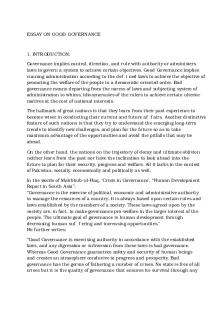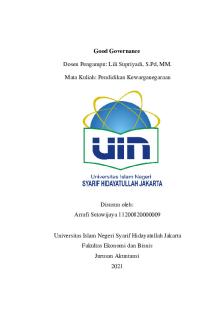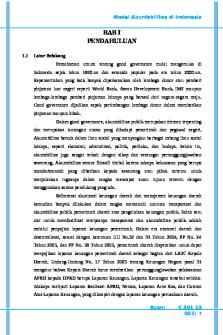UNDP on good governance PDF

| Title | UNDP on good governance |
|---|---|
| Author | Khandakar Elahi |
| Pages | 15 |
| File Size | 396.5 KB |
| File Type | |
| Total Downloads | 34 |
| Total Views | 803 |
Summary
The current issue and full text archive of this journal is available at www.emeraldinsight.com/0306-8293.htm UNDP on good UNDP on good governance governance Khandakar Qudrat-I Elahi York University, Guelph, Canada 1167 Abstract Purpose – Since the 1990s, most bilateral and supranational donor agenci...
Description
Accelerat ing t he world's research.
UNDP on good governance Khandakar Elahi
Cite this paper
Downloaded from Academia.edu
Get the citation in MLA, APA, or Chicago styles
Related papers
Download a PDF Pack of t he best relat ed papers
Governance and t he Nat ion-St at e: Rousseau’s Relevance in t he Era of Globalisat ion Khandakar Elahi
POLIT ICAL SCIENCE AND PUBLIC ADMINIST RAT ION (Civil Societ y and t he St at e) BY: DAT IUS DIDACE DAT IUS DIDACE civil societ y and st at e Ramadhani Midole
The current issue and full text archive of this journal is available at www.emeraldinsight.com/0306-8293.htm
UNDP on good governance
UNDP on good governance
Khandakar Qudrat-I Elahi York University, Guelph, Canada
1167 Abstract Purpose – Since the 1990s, most bilateral and supranational donor agencies have been pursuing “good governance” as their priority development policy. Yet, in their own evaluation, the speed of progress of this gargantuan governance project has remained unsatisfactory. The purpose of this paper is to examine the causes of this slow progress by scrutinizing its conceptual foundation. Design/methodology/approach – The analytical approach of this paper is purely speculative, which is occasionally supported by real world data and socio-political evidences. Since the paper uses Governance for Sustainable Human Development – A UNDP Policy Document as the ruling reference material, the paper has been so titled. Findings – First, defining governance as a process misrepresents its problematic nature, which is primarily political and therefore diverts world attention from its root-causes. Second, governance literature treats the state and government as synonymous and by that confuses their political nature. Finally, the paper assigns an all-impressing role to civil society organizations (CSOs) in promoting good governance in the developing world. However, experience shows that they are deeply involved in the creation and continuation of poor governance in the developing country. Practical implications – Humankind now lives in a global village divided into territorially demarcated political units. Accordingly, the peace and prosperity of the global village critically depend upon how democratically each of member state is governed. Good governance in turn hinges on politically trained intelligent and ethical individuals running public administration. The analytical opinions of the paper underline this notion. Originality/value – The paper shows that the ongoing development discourse on good governance revolves around a faulty conceptual foundation. By reviewing the major ideas of the governance paradigm, it clarifies the conceptual connections between political theories and democratic governance.
Received July 2009 Accepted July 2009
Keywords Individual development, Governance, Society, State, Government Paper type Research paper
1. Introduction The term, “good governance” was first mentioned, causally, in the World Bank’s (1989) report: Sub-Sahara Africa: From Crisis to Sustainable Growth – A Long-Term Perspective Study. Within a decade, the idea crystallized into the most popular international development policy project. The major bilateral and supranational donor agencies put the project at their apex policy agenda and redefined the conceptual framework of their aid policies. One of the organizations, which took particular interest in the idea, is the United Nations Development Programme (UNDP). The mission and mandate of UNDP is to materialise sustainable human development in the developing world, which is inseparable good governance. This proposition was forcefully forged in the 1997 policy paper Governance for Sustainable Human Development – A UNDP Policy Document (UNDP, 1997): This is the revised version of the paper presented at the Atlantic Canada Economics Association, Acadia University, Wolfville, Nova Scotia, 24-26 October 2008.
International Journal of Social Economics Vol. 36 No. 12, 2009 pp. 1167-1180 q Emerald Group Publishing Limited 0306-8293 DOI 10.1108/03068290910996981
IJSE 36,12
1168
Governance and human development are indivisible. Human development cannot be sustained without good governance. Governance cannot be sound unless it sustains human development. The UNDP believes that developing the capacity for good governance is a primary means of eradicating poverty.
And the UNDP believes that it has added advantages in promoting good governance in the developing world compared to other external development partners. The UNDP has remained true to its promise. In 2008, it allocated 34 per cent of its budget to democratic governance, 72 per cent of this money was invested in making democratic institutions more accountable and responsive to citizens and 46 countries are receiving parliamentary supports from UNDP (2009a). Besides, the UNDP, other supranationals, like the World Bank and bilateral agencies like, United States agency for international development (USA), Canadian international development agency (Canada), Japanese international cooperation agency (Japan) and Department of international development (UK) are supporting good governance projects in the developing countries. Yet, the outcomes of these impressing external efforts are far remote from their expectations. In his 2005 report to Economic and Social Council, the UN Secretary-General was highly critical about the achievement of good governance (United Nations (UN), 2005). The progress of the LDCs as a group, the report reveals, was insufficient to meet the goals of the Brussels Programme of Action and its objectives of eradicating poverty, sustained growth and sustainable development. It also identifies the major obstacles persistently hampering implementation of the Programme of Action, which are weakness in three crucial areas – country ownership, national capacity and resources. From governance perspective, country ownership is most critical. It signifies political mobilization within a country to implement its developmental strategy, including the externally aided projects, programs and policies. Naturally country ownership requires the political party in power to garner sufficient support in favour of its development strategy among stakeholders both within and outside of government (World Bank, 2009). This includes line ministries, parliament, sub-national governments, civil society organizations and private sector groups. Evidently, country ownership is critically important for good governance in any sovereign nation. When people in power fail to mobilise their citizens around their policies and activities, it simply means, in political term, that they are governing without “general consent” – an indicator of poor governance. Thus, the international development community needs to investigate factors responsible for the unsatisfactory improvement in country ownership. This investigation can be pursued from different angles. However, the angle that appears under-explored is the conceptual foundations of “governance” and “good governance” and the key institutions supposed to achieve these goals – the state, private sector and civil society organisations. For example, ordinary understanding about the ideas of governance and good governance is that they are somehow related to the performance of government, the political institution responsible for exercising the executive power of the state. Yet, the literature hardly talks about the performance of the regime in power. They constantly talk about the state and its relation with the civil society and the private sector. Does this mean that the state and government are synonymous? Do these words refer to the same political institution?
To highlight these conceptual confusions, this paper uses the 1997 policy paper of UNDP document mentioned above, as the ruling reference material. A pre´cis of the main concepts and their relations articulated in the UNDP policy papers are presented in Section 2. Section 3 describes the main concepts of good governance – social contract, civil society, the state and government – from their historical perspectives. Section 4 critically examines the key ideas and their conceptual connections conceived in the UNDP policy document, and the paper is concluded in Section 5. 2. Governance for sustainable human development Human development is a process of enlarging people’s choices, achieved through expanding human capabilities and functionings (UNDP). The process includes three essential capabilities for human development – leading long and healthy life, be knowledgeable and having a decent standard of living. However, the realm of human development goes further: essential areas of choice range from political, economic and social opportunities for being creative and productive to enjoying self-respect, empowerment and a sense of belonging to a community. There are five aspects to sustainable human development that particularly affect lives of the poor and vulnerable: empowerment, cooperation, equity and sustainability and security. As noted above, the mission and the mandate of the UNDP are to promote sustainable human development in the developing world. Accordingly, the policy document conceptually connects good governance idea with organisation’s mandate. It first defines and discusses governance and good governance, and then describes their conceptual connections with the state, private sector and civil society. The following is a pre´cis of each of these concepts. Governance According to the 1997 policy paper, governance is the exercise of economic, political and administrative authorities to manage a country’s affairs at all levels. It comprises mechanisms, processes and institutions, through which citizens and groups articulate their interests, exercise their legal rights, meet their obligations and mediate their differences. Governance has “three legs”: economic, political and administrative. Economic governance includes decision-making processes that affect a country’s economic activities and its relationships with other economies. Political governance is the process of decision making to formulate policy. Administrative governance is the system of policy implementation. A new report – jointly published by UN Office of the High Representative for the Least Developed Countries, Landlocked Developing Countries and the Small Island Developing States and the UNDP (2009b) – provides a slightly different version. Democratic governance is a political system that incorporates into the notion of good governance, not only efficient processes, but also principles and institutions that secure the civic rights and freedoms of all people, including the poorest of the poor and marginalized groups. Furthermore, any idea of good governance that values human progress must logically satisfy one of two criteria. At the very least, it must not retard development, and at best should contribute to its advancement. As a conceptualisation of democratic governance that is fundamentally normative, it aims to be coherent and generally acceptable. In addition, such a framework must be pragmatic and flexible for it to remain relevant to the evolving realities of the 50 LDCs.
UNDP on good governance
1169
IJSE 36,12
1170
Good governance While governance is understood as the exercise of economic, political and administrative authorities to manage a country’s affairs, good governance is defined as the processes and structures that guide political and socio-economic relationships. The absence or extent of good governance is implied by several characteristics: participation means all men and women have voices in decision making, either directly or through legitimate intermediate institutions. Rule of law refers to fair and impartially enforced legal frameworks. Transparency signifies the processes, institutions and information accessible directly to those concerned. Responsiveness means institutions and processes serve the concerned stakeholders. Good governance is consensus-oriented meaning it creates broad consensus through mediations among different stakeholders. Equity – all men and women have opportunities to improve or maintain their well-being. Effectiveness and efficiency – processes and institutions produce results that meet needs while making the best use of resources. Accountability – decision makers in government, the private sector and civil society organisations are accountable to the public, as well as to institutional stakeholders. Strategic vision: Leaders and the public have a broad and long-term perspective on good governance and human development, along with a sense of what is needed for such development. There is also an understanding of the historical, cultural and social complexities in which that perspective is grounded. Interrelated, these core characteristics are mutually reinforcing and cannot stand-alone.
The state “Governance encompasses the state, but it transcends the state by including the private sector and civil society organisations”. “In countries where electoral processes exist, the state is composed of an elected government and an executive branch”. Based on this definition, the policy paper lists the major functions of the state: “Being the focus of the social contract, it defines citizenship”; being the mandated authority it controls and exerts force, and is responsible for public services’. It creates an enabling environment for sustainable human development, meaning establishing and maintaining stable, effective and fair legal-regulatory frameworks for public and private activities, ensuring stability and equity in the marketplace, mediating interests for the public good and providing effective and accountable public services. Private sector Sustainable human development demands, and depends on, job creation for the mass. The private sector is mainly responsible for this purpose in the non-communist state. The state can help the private sector in performing this responsibity through several measures: . creating a stable macroeconomic environment; . maintaining competitive markets; . ensuring that the poor (especially women) have easy access to credit; . nurturing enterprises that generate abundant jobs and opportunities; . attracting investment and helping knowledge and technology transfer to the poor; . enforcing the rule of law;
. .
providing incentives for human resource development; and protecting environment and natural resources.
Civil society Civil society, lying in-between the state and private sector, consists of individuals and groups interacting among themselves socially, politically and economically: Civil society organisations are the host of associations around which society voluntarily organises. They include trade unions; non-governmental organisations; gender, language, cultural and religious groups; charities; business associations; social and sports clubs; cooperatives and community development organisations; environmental groups; professional associations; academic and policy institutions; and media outlets. Political parties are also included, although they straddle between civil society and the state if they are represented in parliament.
“Civil society also protects the rights of all citizens”. As the state and the private sector are being reshaped and their relationships redefined, civil society is changing in important ways. Civil society is more than just society. It is the part of society that connects individuals with the public realm and the state – it is the political face of society. Civil society organisations channel people’s participation in economic and social activities and organize them into more powerful groups to influence public policies and gain access to public resources. They can provide checks and balances on government power and monitor social abuses. They also offer opportunities for people to develop their capacities and improve their standards of living – by monitoring environment, assisting disadvantaged, developing human resources and helping communication among business people. Finally, civic networks ease the dilemmas of collective action by institutionalising social interaction, reducing opportunism, fostering trust and making political and economic transactions easier. Well-developed civic networks also amplify flows of information – the basis for reliable political, economic and social collaboration and public participation of civil society members. These relationships and social norms make up a nation’s social capital. 3. Social contract, civil society, the state and government The UNDP policy document includes six key concepts – human development, governance, good governance, the state, private sector and civil society. Human development is the goal; good governance is the means; and the state, private sector and civil society are the political and non-political institutions/agencies involved in the governance process. The achievement of a social/political goal is conditional upon the sound conceptualisation of the linkages among key institutions involved. This in turn requires factual description of each of these institutions. One might suspect whether the UNDP document fulfils this requirement of logics. With a view to shedding some light on this point, this section explores the conceptual connections among four political vocabularies – social contract, civil society, the state and government – from the perspectives of political philosophy. The justification for doing this is that the state is a political institution and is founded on political values and beliefs, which are codified and justified in the political philosophy literature.
UNDP on good governance
1171
IJSE 36,12
1172
Naturally, to understand the problems of governance in the developing world and the UNDP’s proposal and policy to improve this situation by coordinating the activities of the state, private sector and civil society, we need to know those values and beliefs. These cannot be found in the governance literature, although its authors freely use those concepts as they find them convenient to support their conceptions. The governance issue has received utmost attentions from some of the humanity’s wisest minds including Plato and Aristotle. However, the writings, particularly relevant for this discussion, are those of John Locke and Jean-Jacques Rousseau. Locke begins Second Treatise on Government with the proclamation that individuals, ambitious of ruling or exercising “political right”, must seek people’s consent. Rousseau on the other hand, introduces The Social Contract with these words: I want to inquire whether there can be some legitimate and sure rule of administration in the civil order, taking men as they are, and laws as they can be. I will always try in this enquiry to bring together what right permits with what interest prescribes, so that justice and utility do not find themselves at odds with one another.
The good governance literature, a closer look would reveal, also deals with the same problem but in a different time and a different context. Social contract Social contract is a conceptual watershed that acts as a facilitator in the humankinds’ transition from the State of Nature to civilised life. In order to trace the natural growth of human society, Locke and Rousseau, following Hobbes, postulated that people lived in the State of Nature before submitting them under the authority of civil government. As Locke (1976, p. 4) says: To understand political power right, and derive it from its original, we must consider, what state all men are naturally in, and that is, a state of perfect freedom to order their actions, and dispose of their possessions and persons, as they think fit, within the bounds of the law of nature, without asking leave, or depending upon the will of any other man.
The State of Nature is also a state of equality; all powers and jurisdictions i...
Similar Free PDFs

UNDP on good governance
- 15 Pages

Essay ON GOOD Governance
- 11 Pages

Good Governance
- 7 Pages

GOOD GOVERNANCE
- 40 Pages

GOOD CORPORATE GOVERNANCE
- 14 Pages

Module 1 - Good Governance
- 10 Pages

good governance exam
- 6 Pages

GOOD CORPORATE GOVERNANCE
- 25 Pages

prinsip good governance Jepara
- 8 Pages

Makalah Good Corporate Governance
- 12 Pages

Makalah Good Governance
- 11 Pages
Popular Institutions
- Tinajero National High School - Annex
- Politeknik Caltex Riau
- Yokohama City University
- SGT University
- University of Al-Qadisiyah
- Divine Word College of Vigan
- Techniek College Rotterdam
- Universidade de Santiago
- Universiti Teknologi MARA Cawangan Johor Kampus Pasir Gudang
- Poltekkes Kemenkes Yogyakarta
- Baguio City National High School
- Colegio san marcos
- preparatoria uno
- Centro de Bachillerato Tecnológico Industrial y de Servicios No. 107
- Dalian Maritime University
- Quang Trung Secondary School
- Colegio Tecnológico en Informática
- Corporación Regional de Educación Superior
- Grupo CEDVA
- Dar Al Uloom University
- Centro de Estudios Preuniversitarios de la Universidad Nacional de Ingeniería
- 上智大学
- Aakash International School, Nuna Majara
- San Felipe Neri Catholic School
- Kang Chiao International School - New Taipei City
- Misamis Occidental National High School
- Institución Educativa Escuela Normal Juan Ladrilleros
- Kolehiyo ng Pantukan
- Batanes State College
- Instituto Continental
- Sekolah Menengah Kejuruan Kesehatan Kaltara (Tarakan)
- Colegio de La Inmaculada Concepcion - Cebu




